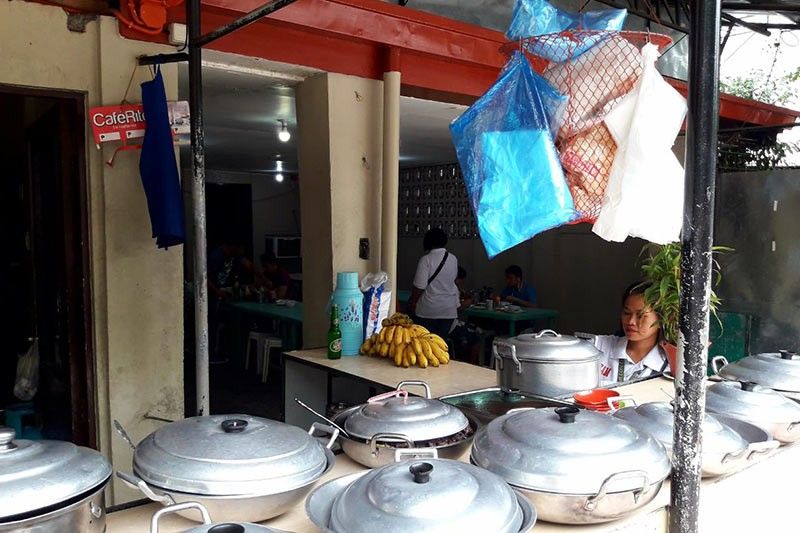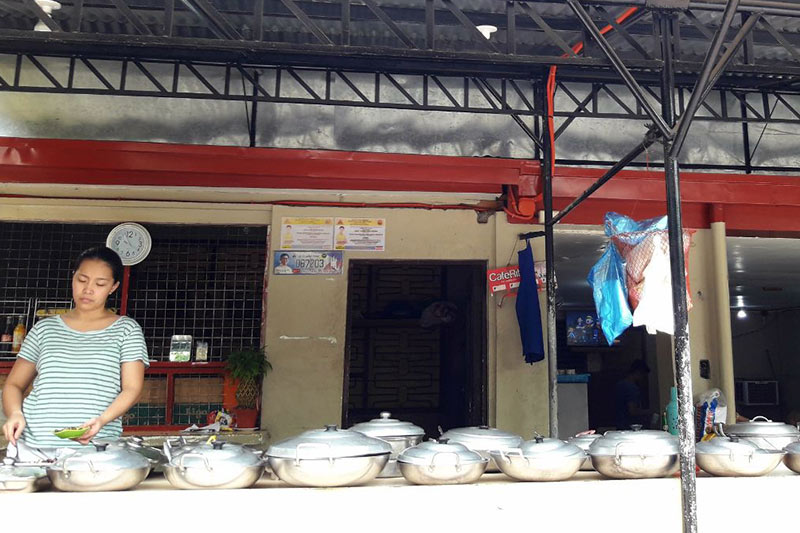To cope with rising prices of goods, students scrimp, stick to a budget

MANILA, Philippines — Because she has decided to give up the dormitory where she stayed for three years, college student Faye Margarette de Leon will have to commute from Rizal to Manila when her classes start in August.
While the two-hour commute can be exhausting and even risky, it will only cost her P200 daily or about P4,000 per month, cheaper than her P6,000 monthly dormitory fee. To avoid being late for her 7 a.m. class, De Leon has to wake up as early as 3 a.m. She is expected to get home at the earliest at 9 p.m. because of her class requirements.
What will make commuting more difficult for Faye is her health condition. Commuting in a polluted and crowded metropolis is not advisable for someone with asthma but she agreed to do so because of a reality that is out of her control.
“I had to give up living in a dorm so my family's monthly budget will suffice…Giving up the dorm life will be much beneficial (despite) the hassle of (commuting),” the University of Santo Tomas English Studies student said.
“I really have no choice but to do it. It’s bad that I had to give up the convenience of living near UST but it would be way worse if I put my OFW (overseas Filipino worker) single mom in a really tight position of forcing her to provide something that is beyond her reach.”

De Leon is one of the students hit by the rising commodity prices, which some sectors have blamed on the Tax Reform for Acceleration and Inclusion.
The law, which seeks to raise funds for key infrastructure projects and social services, imposed new taxes on diesel, liquefied petroleum gas, kerosene and bunker fuel for electricity generation and higher taxes on other oil products.
Economic managers, however, claimed that the price spikes were mainly caused by higher rice prices, a weak peso, and rising oil prices in the world market.
While there are clashing views on the cause of price hikes, it cannot be denied that the students are also affected by the phenomenon even if a huge majority of them are not yet paying taxes.
Because many of them are not yet employed, they do not enjoy the higher take-home pay caused by the reduction in income tax.
Many of them are also not covered by cash transfers designed to help poor families cope with the impact of price increases. The higher take-home pay and the cash transfers are usually cited by finance officials when asked how the government would help consumers complaining about the rising commodity prices.
Higher meal costs, lower savings
John Albert Pagunasan, a senior Communication Arts student from the University of the Philippines Los Baños, had to pay more for his meals because his favorite eatery and fast food outlet raised prices recently.
He said some food establishments near UPLB raised prices by as much as P20 per meal. Despite the price adjustments, the eateries offered smaller servings, prompting Albert to buy more food.
“I had to spend more because prices increased or I had to buy more because the servings became smaller. Though I have not experienced its full effect, I am very concerned about the people who own food stalls…They complain (about how) hard (it is) to do business,” he said.
Pagunasan is also worried that commuting via jeepney, which he described as a “life saver” for students scrimping on their budget, may soon be affected by TRAIN.
“As a student, I might feel the impact later when people demand higher fares and that's when I have to shell out more for my transportation,” he said.
Kobe Loterina, a senior college student at the Polytechnic University of the Philippines, shared the same concern, noting that some transport groups have filed a petition seeking higher fares.
Loterina, who commutes daily from Batasan in Quezon City to PUP in Manila spends at least P100 daily for his travel expenses. He also has to spend on his books and his meals.
Loterina observed that the prices of soda went up by P2 while some eateries raised the prices of viands by about P3. When he asked owners of eateries about price adjustments, they claimed it was an effect of the TRAIN law.
“(I) would (also) refrain from buying juice or iced tea from the canteen so I could minimize my expenses,” he said.
“Parang kung walang TRAIN law, wala naman ganito dati. (It wasn’t like this before TRAIN Law took effect),” he added.
De La Salle College of Saint Benilde student Beatrice Molina said she was disappointed that she now only saves P200 from her P500 daily allowance because her transportation costs soared to P300 from P200. She believes the tax reform law will “surely have a domino effect.”
“I’m a little skeptical about the change promises… I don’t think this reform is something that gets worse before it gets better like what most people claim. I think it’s more of a rabbit hole we’re all about to go through,” Molina said.
Because of higher transport costs, Molina had to limit her use of transport-hailing service Grab and started to bring home-made meals to school.
Tighter budget
Maria Cristina Medina, a post-graduate student with two daughters, said she is strictly following her budget plan so that she would have enough for the needs of her family.
“This TRAIN law really affects… average earners like me or consumers like me... I got no choice but to adjust (to) the situation like lessen the intake of coffee and other sweet products,” she said.
“My husband and I make sure that before we spend our money buying stuff for ourselves, we always set aside a big part of our salaries for the family's priorities, particularly the allowances and tuition.”
The higher commodity prices also forced Roy Narra, a working graduate student from UST, to identify his spending priorities and to set aside non-essential items.
“As a middle-class working student, I have to rearrange my budget… (TRAIN) mostly affected my budget for food because most, if not all, of the meals I buy have a higher price now… I (now) go to carinderias (eateries) than in (restaurants) because it's much cheaper there,” Narra said.

While TRAIN exempts those earning an annual taxable income of P250,000 and below from paying personal income tax, Roy said his salary is not enough to buy himself leisure items.
Unlike other students interviewed for this report, De Leon believes “other economic factors,” not just TRAIN, caused the upward price adjustments.
“I understand that (TRAIN) is one of the reasons why there's a sudden surge in prices... but I do know that there are other economic factors as to why this is happening,” she said.
‘Minimal’ impact
Trade Secretary Ramon Lopez said the TRAIN law, which is seen to raise more than P786 billion in state revenues in the next five years, has a “minimal” impact on students.
“Students don't need to adjust with the prices and everything. What people claim as price hikes are more on rhetoric since prices didn’t increase that much,” Lopez said in a chance interview.
Asked to react to the adjustments that students had to make because of TRAIN, Lopez insisted that the middle-income earners should not blame the price hikes on the law.
“In reality, they won’t feel TRAIN law’s effect. They buy basic goods, the food they buy may not have increased at all… If eating at restaurants is too expensive, they should buy bread, buy instant noodles. The prices of those goods did not increase,” the trade chief said.
“Filipinos are clever. If they really want to save money, they can. (TRAIN) only has minimal impact so they should not worry,” he added.
The Department of Trade and Industry (DTI) has claimed that prices of basic necessities remained stable despite the implementation of the TRAIN law.
After comparing the prices of basic necessities from June 11 to 15, 2018 with those in November last year, DTI said only four out of 101 shelf keeping units in basic necessities showed “minimal” price hike of 1 to 7 percent.
Basic necessities include sardines, milk, coffee, detergent bars, bread, instant noodles and bottled water. For prime commodities like canned meat products, condiments, bath soap and battery, only 13 out of 43 items posted ian ncrease of 1 to 8 percent, DTI added.
Lopez said students would even benefit from the TRAIN law through the free tuition offered in state-run universities and colleges. He also claimed that fare hikes are unlikely to happen since jeepneys would be granted subsidies through the “Pantawid Pasada” program to be launched in July.
What students can do
Carlos Manapat, an economics professor from UST, said students have no choice but to use the allowance given to them by their parents wisely. He said students can refrain from buying products that are affected by the TRAIN law.
“There are some goods that we can’t avoid from having like food for example. That’s why when there is price hike in food, a person would still consume but that person would lessen the amount of consumption as a net effect,” Manapat said in a phone interview.
Students, Manapat said, should also refrain from consuming “unnecessary goods” and “luxurious” items to cushion the law’s effect.
“They should avoid consuming… soft drinks, sweetened beverages and vices such as cigarettes and liquors… If they can avoid watching movies, if they don’t really need it, then maybe they shouldn’t watch,” the economics professor said.
Jeepney drivers should also retain the fare discounts given to students, he added.
Zak Yuson, government liaison for think tank Action for Economic Reforms, said students could find part-time work or spend money carefully to temper the effects of higher prices.
‘TRAIN beneficial to Philippines’
Yuson also encouraged students to view the TRAIN law in a positive light.
“I think the important aspect here is to look at your overall welfare as a college student. If the government increased revenues, they would have more money to fund things which could help you through education such as training and development programs and cash transfers for the poor,” he said.
Yuson claimed the tax reform law would likewise benefit public health and the environment.
“Personal income and take home pay increased. Excise tax on products (that) are detrimental to one’s health also increased… One would minimize the consumption of these products because of the tax,” he said.
“At the same time, excise taxes on petroleum which harms the environment also increased. When you limit your consumption of petroleum, you help the environment.”
Manapat and Yuson believe that while TRAIN is not a perfect law, it is beneficial to the country because it would support government spending that can promote economic activity.
“It is beneficial because it will increase the collection of the government. All things being constant, this is a really good thing for everybody…The increase in taxes is normal as long as you achieve your objective aside from collecting taxes,” Manapat said.
While the perceived long-term benefits of the TRAIN law remain unrealized, students like De Leon would have to make what she described as “little sacrifices.”
“I adjust, I try to make it work, and be thriftier than I was before,” she said. — Photos and story by The STAR intern Job Manahan
- Latest































